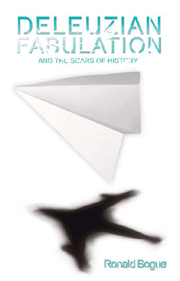Book contents
- Frontmatter
- Contents
- Acknowledgements
- Introduction
- 1 The Concept of Fabulation
- 2 Becoming-Prophet: Zakes Mda's The Heart of Redness
- 3 Becoming-Child, Becoming-Untouchable: Arundhati Roy's The God of Small Things
- 4 Becoming-Memory: Roberto Bolaño's Amulet
- 5 Becoming-Woman, Becoming-Girl: Assia Djebar's So Vast the Prison
- 6 Becoming-Fish: Richard Flanagan's Gould's Book of Fish
- Conclusion
- Bibliography
- Index
- Miscellaneous Endmatter
2 - Becoming-Prophet: Zakes Mda's The Heart of Redness
Published online by Cambridge University Press: 12 September 2012
- Frontmatter
- Contents
- Acknowledgements
- Introduction
- 1 The Concept of Fabulation
- 2 Becoming-Prophet: Zakes Mda's The Heart of Redness
- 3 Becoming-Child, Becoming-Untouchable: Arundhati Roy's The God of Small Things
- 4 Becoming-Memory: Roberto Bolaño's Amulet
- 5 Becoming-Woman, Becoming-Girl: Assia Djebar's So Vast the Prison
- 6 Becoming-Fish: Richard Flanagan's Gould's Book of Fish
- Conclusion
- Bibliography
- Index
- Miscellaneous Endmatter
Summary
Zakes Mda (the pen name of Zanemvula Kizito Gatyeni Mda) has spent most of his literary career in an artistic engagement with the social and political struggles of South Africa, both before and after Apartheid. In the 1970s and 1980s, he devoted his efforts primarily to the theatre, combining traditions of African oral narrative, the Xhosa Intsomi Theatre and the Western Theatre of the Absurd in over thirty dramas of protest and cultural critique. With Ways of Dying in 1995, Mda turned from the theatre to fiction, following that novel with She Plays with the Darkness (1995), The Heart of Redness (2000), The Madonna of Excelsior (2002), The Whale Caller (2005) and Cion (2007). Of these works, perhaps none more fully exemplifies the dynamics of fabulation than does The Heart of Redness.
The novel's central conflict is indicated in its Conradian title. The heart of the Xhosa people is in their traditions and customs. For those Xhosa inhabiting the Wild Coast region of South Africa, about 650 miles east of Cape Town along the Indian Ocean, the redness of the ochre dye that the women smear on their bodies and use to colour their clothing is a symbol of their culture. Some of the Xhosa, however, reject Xhosa traditions and object to those who would perpetuate native practices. ‘“They want us to remain in our wildness!” says the elder. “To remain red all our lives! To stay in the darkness of redness!”’.
- Type
- Chapter
- Information
- Deleuzian Fabulation and the Scars of History , pp. 49 - 73Publisher: Edinburgh University PressPrint publication year: 2010



